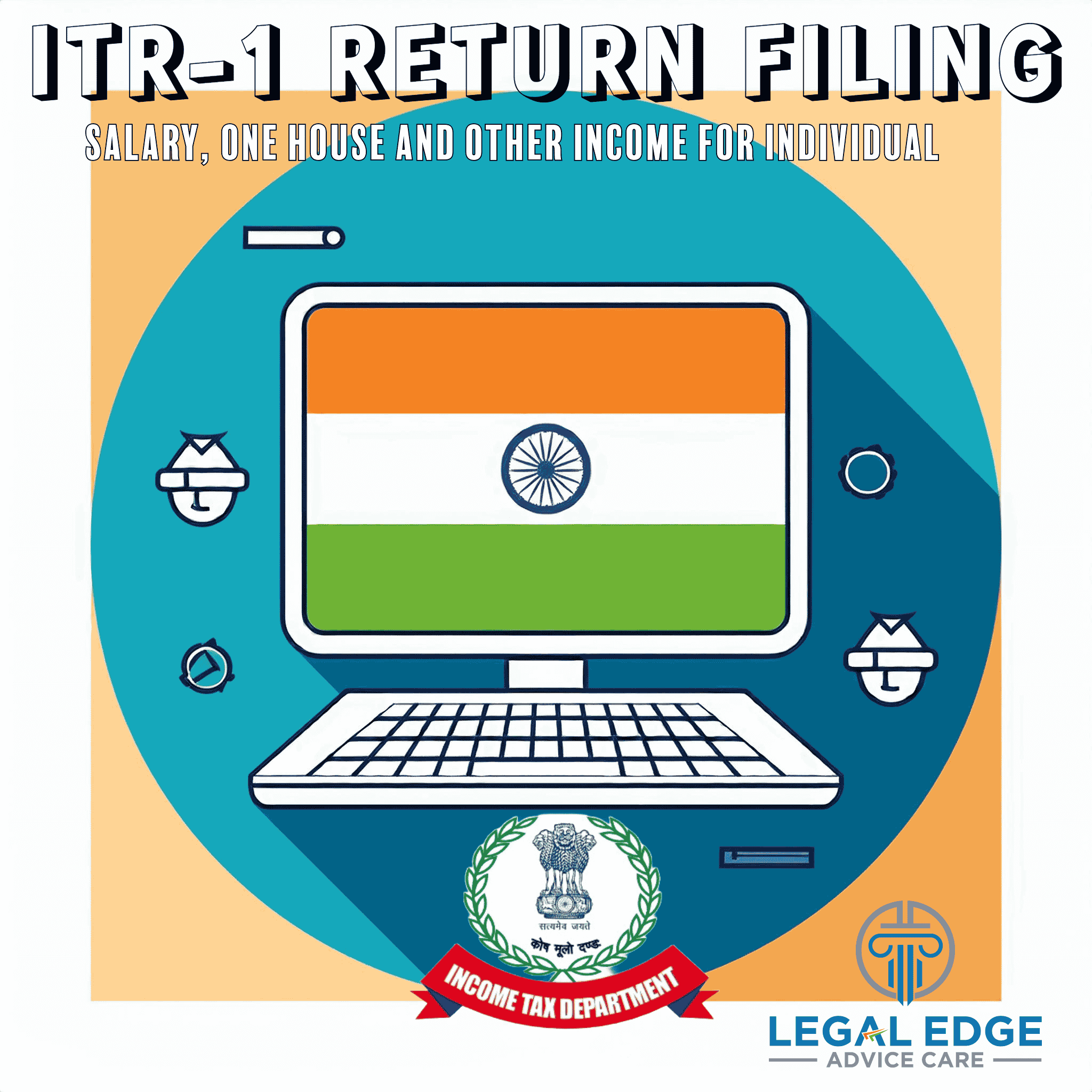

Documents Required
Form 16
Bank Statement
Details of Other Income
ITR-1 Return Filing
ITR-1 (Sahaj) Filing
ITR, or Income Tax Return, is a crucial document in which taxpayers report their income and applicable taxes to the income tax department. The Income Tax Act of 1961 outlines all the ITR forms and their procedures. Among these forms, ITR-1, often referred to as Sahaj, holds particular significance. ITR-1 (Sahaj) is designed for individuals with an income of up to Rs.50 lakhs, making it applicable to most salaried individuals.
IndiaFilings offers a seamless and efficient solution for filing Income Tax Returns using the ITR-1 form in India. Our team of experts guides you through the entire process, ensuring that you meet your tax compliance obligations effortlessly.
What is ITR?
An Income Tax Return (ITR) is a document used by taxpayers to report details about their income earned and the corresponding tax liability to the income tax department. It serves as a formal declaration of an individual or entity's financial information, ensuring transparency and compliance with tax regulations.
The ITR landscape includes seven different forms: ITR-1, ITR-2, ITR-3, ITR-4, ITR-5, ITR-6, and ITR-7. Each taxpayer is required to file their ITR on or before the specified due date. The choice of ITR form depends on factors such as the sources of income, the amount of income earned, and the taxpayer's category, which can include individuals, HUFs (Hindu Undivided Families), companies, and more.
What is ITR 1 Sahaj Form?
The ITR-1 Sahaj Form, as its name implies, serves as a simplified means for individual taxpayers to file their income tax returns. This form is specifically tailored for resident individuals in India whose total income falls below the Rs. 50 Lakhs threshold and originates from the following sources:
Income from Salary or Pension
Income from a Single House Property
Income from Other Sources
The ITR-1 Form simplifies the procedure for eligible individuals to disclose their income tax information, offering a convenient and effective approach to fulfilling their tax obligations.
Who Can File ITR-1
ITR-1 is applicable to Resident Individuals who meet the following criteria:
Income Threshold: The individual's total income for the financial year must not exceed Rs. 50 lakh.
Permissible Income Sources: ITR-1 is suitable for individuals whose income comes from the following sources:
Salary
Income from a single-house property
Family pension income
Agricultural income (up to Rs. 5,000)
Other sources include:
Interest from Savings Accounts
Interest from Deposits (Bank / Post Office / Cooperative Society)
Interest from Income Tax Refund
Interest received on Enhanced Compensation
Any other Interest Income
Family Pension
Clubbing of Income: Combining income with a spouse's or a minor's income is allowed only if the source of income falls within the specified limits mentioned above.
Who Cannot File ITR-1
The following categories of individuals are not eligible to file ITR-1:
Resident Not Ordinarily Resident (RNOR) and Non-Resident Indian (NRI) individuals
Those with a total income exceeding ₹ 50 lakh
Individuals with agricultural income surpassing ₹ 5,000
Individuals with income derived from activities like lottery, racehorses, legal gambling, etc.
Those with taxable capital gains, both short-term and long-term
Individuals who have invested in unlisted equity shares
Individuals with income sourced from business or profession
Individuals serving as Directors in a company
Individuals availing tax deduction under section 194N of the Income Tax Act
Individuals with deferred income tax on Employee Stock Ownership Plan (ESOP) received from an eligible start-up employer
Individuals who own and generate income from more than one house property
Individuals who do not meet the eligibility criteria outlined for ITR-1 filing.
ITR-1 Due Date
The due date for filing ITR-1 typically falls on July 31st of each assessment year. It's crucial to meet this deadline to ensure that your income tax return is filed on time and in compliance with tax regulations.
Structure of ITR Form 1: A Comprehensive Overview
While ITR Form 1 may seem straightforward, it requires careful attention during the filling process. ITR Form 1 is organized into five distinct parts and two schedules to ensure clarity. These segments include:
Part A: General Information
Personal details such as name, PAN number, age, gender, and date of birth.
Ward and assessing officer details (if known).
Communication address, contact number, city, and state.
Filing date and Aadhaar details.
Part B: Gross Total Income
Information on gross total income, including earnings from salary, property, and other sources.
Part C: Deductions and Total Taxable Income
Details related to deductions under sections 80C, 80D, 80U, and 80G.
Part D: Computation of Tax Payable
Rows covering tax computation, status, rebates, post-rebate taxes, TDS claims, etc.
D20 for bank account details, including account number, bank name, IFSC code, and account type, with an option to specify the account for refund, if applicable.
Part E: Other Information
Schedule IT
Schedule TDS & TCS
The final step in the process involves the verification of the information provided.
Documents Required for Filing ITR 1
ITR (Income Tax Return) forms are attachment-less forms. This means that taxpayers are not required to attach any documents.
However, taxpayers should retain the following documents for their records and be prepared to produce them before tax authorities if requested, particularly in situations like assessments or inquiries.
Form 16: Provided by all your employers for the relevant financial year.
Form 26AS: Ensure that the TDS details in Form 16 match those in Part A of Form 26AS.
Receipts: Retain receipts for exemptions or deductions (e.g., HRA allowance or Section 80C/80D deductions) not submitted to your employer on time to claim them directly on your income tax return.
PAN Card: Your Permanent Account Number (PAN) card is essential for identification.
Bank Investment Certificates: Details of interest earned from bank accounts, such as bank passbooks or fixed deposit certificates.
Required Details in ITR1 Form
Part A: This section captures personal information, including PAN number, age, gender, address, and communication details.
Part B: Information on gross total income, including earnings from salary, property, and other sources.
Part C: Details related to deductions under sections 80C, 80D, 80U, and 80G.
Part D: Tax computation, status, rebates, post-rebate taxes, TDS claims, and bank account details.
Types of Income Excluded from ITR-1 Form
Profits and Gains from Business or Profession
Income from More than One House Property
Capital Gains (Short-term or Long-term)
Income from owning and maintaining racehorses
Winnings from lotteries
Income subject to special rates under Section 115BBDA or Section 115BBE
Income is meant to be distributed as per the regulations of section 5A
Penalty for late Filing of ITR-1
Individuals with a total income exceeding Rs 5 lakh may face a penalty of Rs 5,000, while those with income below this threshold may incur a reduced penalty of Rs 1,000.
Additionally, if you owe taxes and fail to file the return by the due date, you will be liable for additional interest at a rate of 1% per month until you submit the return.
In more severe cases, penalties can be imposed for underreporting or misreporting of income. Underreporting may lead to penalties of up to 50% of the tax underreported, while misreporting can result in penalties of up to 200% of the misreported tax amount.
Furthermore, repeated failure to file tax returns despite reminders from tax authorities may lead to prosecution procedures. This could result in imprisonment ranging from three months to seven years, depending on the outstanding tax liabilities.
How can IndiaFilings help in ITR-1 (Sahaj)?
IndiaFilings provides valuable assistance in filing your ITR-1 (Sahaj) income tax return. We start by helping you select the appropriate form based on your income sources, ensuring accuracy in filing.
We meticulously calculate your tax liability, perform error checks, and prioritize timely filing to reduce the risk of penalties or tax notices. If eligible, we assist in processing your income tax refund efficiently.
Our team of tax experts is available to address your queries and provide guidance throughout the process. IndiaFilings also keeps you updated on tax law changes and deadlines, ensuring your compliance with the latest regulations. With our secure platform, you can trust us to safeguard your financial data while simplifying your ITR-1 filing experience.
5200+
Projects done
15500+
Happy clients
14000+
Income Tax
746+
Incorporation

.jpg)
Yes, late filing of ITR-1 can result in penalties ranging from Rs. 1,000 to Rs. 5,000, depending on your total income. Additional interest may also be charged on outstanding tax liabilities.
Is ITR 1 an annexure less form?The ITR 1 form is an annexure-less return; there is no need to attach any documents such as Form 16 or Form 26 AS with the ITR 1 form.
You can claim deductions under various sections like 80C, 80D, 80U, and 80G in ITR-1 Sahaj, provided you meet the eligibility criteria.
No, if you have income from more than one house property, you cannot use ITR-1 Sahaj. You would need to use a different ITR form.
Is it mandatory to e-file ITR-1 Sahaj, or can I file it physically?E-filing is mandatory for individuals with over Rs. 5 lakhs. However, its recommended for everyone as it simplifies the process and ensures faster processing.
Can I file ITR-1 if I have taxable capital gains?No, if you have taxable capital gains, whether short-term or long-term, you cannot use ITR-1 Sahaj.






